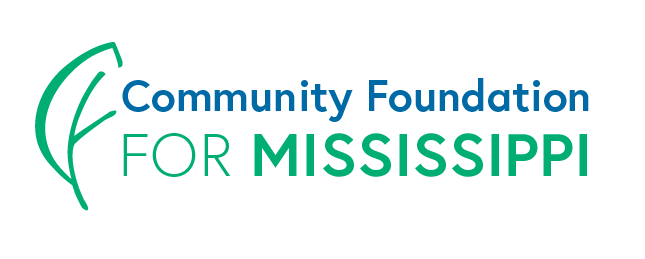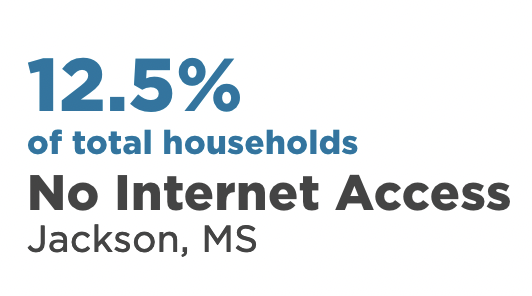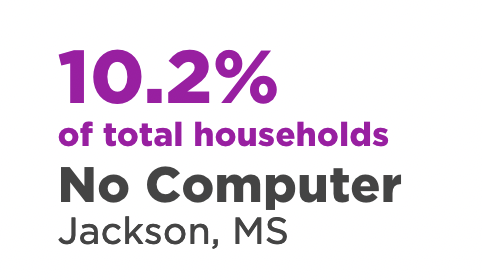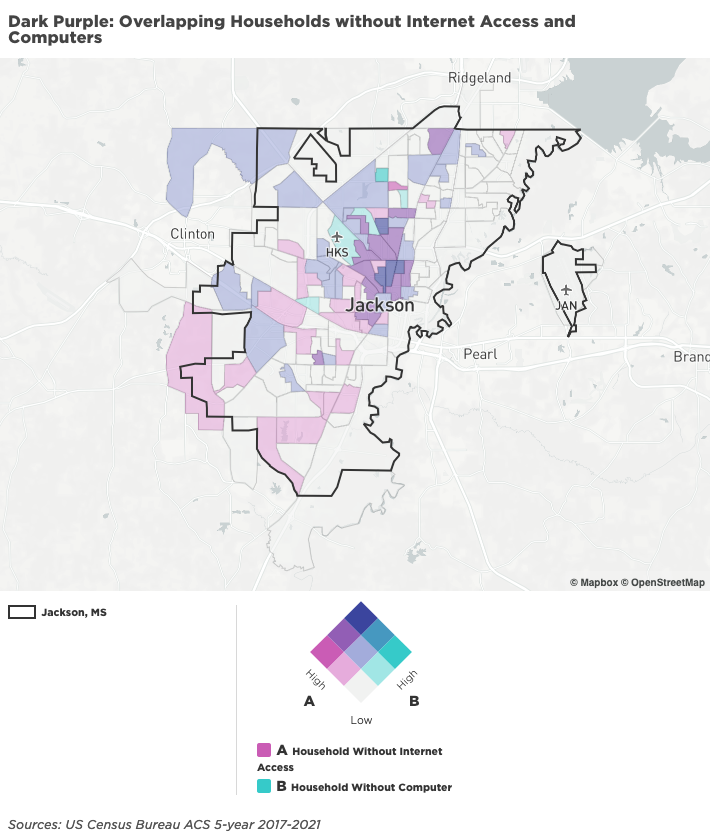
Visualizing Place
The Challenge
The state of Mississippi is in a “data drought,” says Sophie Wolf, Director of Communications at Community Foundation for Mississippi. “There’s not one clearinghouse to find a lot of data, and people are really selective about sharing it if they do have it,” she adds.
There’s also a lack of systematic organization of data. Rather than collecting it in the same way each year, data is collected haphazardly. Without clean, systemized and precise data, it’s difficult for Sophie and her team to accurately measure impact and make better decisions about the communities they serve in Mississippi. As a community foundation, that means it’s tough to equitably distribute funding in counties that need it most.
10
10 internet providers in Jackson, MS
12.5%
12.5% of total households without internet access
10.2%
10.2% of total households without a computer
26,474
26,474 students enrolled in K-12
The Solution
“To really understand our communities, we need data,” Sophie says. “That's where mySidewalk comes in.” The Community Foundation for Mississippi is accessing data, finding insights, and building powerful stories about communities in Mississippi, all powered by mySidewalk's data storytelling workflow.
“I have the numbers, I have the demographics, I have the geographic place, and it's all in one place. It's all complete and right there,” she says.
We’re no longer guessing. We have concrete information that can help us give the other side of the story that wasn’t revealed in the past."
Sophie Wolf
Director of Communications
The Outcomes
Community Foundation for Mississippi
Helping communities harness their philanthropic potential is what we do. We work alongside community leaders, philanthropists, and community partners to make meaningful and lasting change in our state. Because, truly, we are better together.
What's a Community Foundation?
Community Foundation for Mississippi allows individuals to open funds and combine their financial resources to grow investments more quickly. This approach helps fund charitable projects for communities across Mississippi at a faster rate. Community Foundation for Mississippi houses funding for “every type of interest that you could imagine,” Sophie says.
Data plays a huge role in the foundation’s work to support valuable programs and resources. “We’re using data for seeing gaps and barriers, but also to learn how we can give a little more context to the stories we’re telling,” Sophie says.
Mapping is another important part of the data. But, Sophie says, powerful data storytelling is also about visualizing place. “It’s one of the reasons we really love mySidewalk — being able to visualize that in terms of place. That’s crucial to our work, especially finding gaps.”
Visualizing Place in Mississippi
Visualizing data is especially important to the foundation’s county growth strategy. Several years ago, the Community Foundation for Mississippi added extra counties to its service area, Sophie says. Although meeting with community members in-person helps Sophie and her team understand what’s going on in a place, she says that data provides a more holistic view of a community.
“I’ve been creating reports within mySidewalk about counties before we go, because someone may say that … this is how they feel like the educational system is headed for their city. But the data is concrete,” Sophie says. “There’s been some interesting things revealed about pockets of town that people maybe aren’t talking about, that we see we need to focus our efforts.”
As she creates reports, Sophie says that she’s also creating benchmarks for each county. “For each of these reports, all I have to do is swap out said city or county, and then we have a benchmark.” These benchmarks are helpful to understand where things stand in each county that the Community Foundation for Mississippi serves.
Driving Strategic Initiatives
Beyond visualizing place and mapping counties, data drives the Community Foundation for Mississippi’s strategic decisions for nonprofits, grant applications and funding, and even long-term strategic planning.
Sophie says the foundation is starting to help nonprofits build stronger grant pitches with mySidewalk reports. “How can we leverage information that people have, use this data that we have, and put it together, while simultaneously doing some technical assistance to get nonprofits a stronger grant proposal?” To answer this question, Sophie takes organizations along the journey
She recently worked with a nonprofit on some test reports around health equity. The nonprofit provided a map of all the families that they serve, and Sophie pulled it into a mySidewalk report. From there, she offered suggestions on how the nonprofit could use data findings to tell a compelling story and create a rich report for a grant application. This project is just one example of how data supports the strategic development of the Community Foundation for Mississippi, and by association, its strategic partners.
Data is also important to the strategic distribution of grant funding to philanthropic groups in the Community Foundation for Mississippi’s service area.
“We have our own [grant] focus areas: placemaking, children and families, community partnerships, and capacity building,” Sophie says. With data, the Community Foundation for Mississippi is able to review details like where they’ve provided funding in the past, who’s started a grant application but didn’t finish, and who received approval for funding. By mapping these details, it’s easier to find gaps, uncover barriers, and have a conversation to understand the roadblocks to a grant application.
“That starts to tell a story about where capacity is,” Sophie says. “Then there’s stories we want to tell, semi-related to our funds.”





Distributing funds to increase digital inclusion
When Sophie created a digital inclusion report for Jackson, MS, her main goal was to add context to what was going on in the area.
“I thought it would be interesting to talk about [the digital inclusion report] with CS For Y'all,” she says. CS for Y’all is a fund at the Community Foundation for Mississippi that makes computer science more accessible to Jackson Public School students. Although the group agreed that the report was interesting, W.K. Kellogg Foundation (WKKF), a strategic partner of Community Foundation for Mississippi, took an even more hands-on approach after reviewing Sophie’s report.
Jackson, Mississippi, is a focus area for WKKF, with funding funneled through CFM. Although WKKF had been working on a broadband project, it had to be reworked during the COVID-19 pandemic.
“We had been working on getting a lot more access to Jackson Public Schools (JPS) students,” Sophie says. “Like many students, when they had to go virtual, they were having to deal with equipment issues, like not having the internet in their homes.”
WKKF decided to install transmitters in areas where internet connectivity and device access is limited for Jackson students. One major roadblock included trying to decide if the transmitters were being put in areas that needed them the most.
“What the mySidewalk report showed is where they needed to put these transmitters,” Sophie says. “This [report] kind of confirmed those hunches that in purple and blue, this is an area where we need to put them to actually have the best impact.”
The digital inclusion report for Jackson, MS, shows that major areas of town do not have internet connectivity and a digital device. In some areas, families may have a cell phone but no computer. With the installation of transmitters, students and their families can access the internet at home.
“What they’re doing is going to give 288 devices to families that will receive that signal from school property. These are people that live in the nearby area, and it will be like a hotspot,” Sophie says. “They can use the JPS devices that all students are given to connect to the internet. This is going to be huge for connectivity in these areas.”
In Sophie’s words, the digital inclusion report for Jackson, MS, is just a “toe dip” for what the Community Foundation for Mississippi can do to continue supporting local communities. She says that the foundation’s recently approved three-year strategic plan “really baked data” in, and even calls for producing some mySidewalk reports, because of the power that data holds for Mississippi communities.
“The words we use constantly are ‘meaningful and measurable change.’” Sophie says. “That’s what we’re trying to do, that's actually in our mission statement. Data is a way to get there.”
Where are we now?
Transmitters have been installed in areas where internet access is extremely limited and 288 devices have been given to families to connect to the internet in Jackson, MS.
What are you waiting for?
Get started with mySidewalk demo today!
